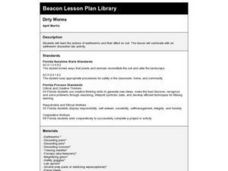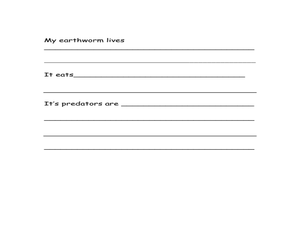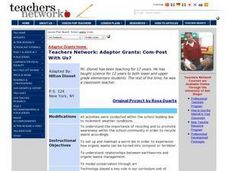Curated OER
Bugs, Worms and Others
Students explore biology by conducting an outdoor research activity. In this insect identification lesson, students collaborate with classmates to examine organisms they find on a class field trip either in their school playground or a...
Curated OER
Animal Activities: Teacher's Pets
Pupils watch meal worms turn into beetles in the classroom.
Curated OER
Animals of the Fire Ice
Students examine ocean life by identifying methane hydrates. In this ocean life lesson, students research organisms that live in the coldest, deepest parts of the ocean and live off methane hydrates. Students create a group...
Curated OER
Creeping and Crawling Observing Mealworms and Earthworms
Young scholars observe the inherited traits in earthworms and mealworms. In this organisms lesson, students view a live mealworm and earthworm on a tray and identify the body parts. Young scholars measure the worms and observe the...
Curated OER
What do Earthworms Like to Eat?
Students encounter three ecosystems for earth worms prior to performing an experiment. It will introduce students to one form of ecosystem as well as demonstrate how earthworms and the foods they eat affect the environment in which they...
Curated OER
Worm Composting: Vermiculture
Students compost in a limited space and describe the decomposing process. Students convert unwanted, organic matter, particularly food scraps and paper into fertile soil.
Curated OER
Working Worms
Students study earthworms and their role in creating healthy soil for healthy food. In this earthworms and soil lesson plan, students complete an jug experiment to learn about the role of earthworms and healthy soil. Students read and...
Curated OER
Worms Attack
Fourth graders observe earthworms and record their observations. They test to find how earthworms react to touch and moisture. After their study of earthworms, they do a creative writing activity in which they tell about life from the...
Curated OER
One Tough Worm
Students explain the process of chemosynthesis. They are able to explain the relevance of chemosynthesis to biological communities in the vicinity of cold seeps.
Curated OER
Dirty Worms
Students examine the functions of earthworms and their effect on soil. They conduct an earthworm dissection lab, and complete a checklist.
Curated OER
Earthworm Bridge
Fourth graders complete analysis experiments for decomposers and their adaptable traits. In this decomposers lesson, 4th graders test worm behavior to light, sound, warmth, touch, and moisture. Students work in groups to analyze the...
Curated OER
Investigating the Behavior of Lumbriculus
Students perform a classroom experiment on the organisms of worms. They view the behaviors of the worms and analyze their results. This lesson introduces students to the techniques involved in behavioral studies.
Curated OER
Then What Happened?
Young scholars complete activities about the story "Diary of a Worm", by Doreen Cronin. In this reading comprehension instructional activity, students make predictions and apply prior knowledge about the topic of the story. They actively...
Curated OER
Animals of the Fire Ice
Students study ice worms and describe how they interact with other species. In this methane hydrate lesson plan students study ice worms and hydrate shrimp to learn their behavior and can participate in an optional activity.
Curated OER
Earthworms and Making a Wormery
Students explore the environment by researching insects. In this earthworm instructional activity, students utilize soil and plexiglass to build a see through wormery in which students can observe the worms at work. Students identify the...
Curated OER
Collecting Compost
Students observe a composting box. In this soil lesson plan, students create a composting bin by using a bin, newspaper, worms, and food scraps. Students create a composting food web.
Curated OER
Mealworm Exploration
Second graders explore and discover different things about mealworms. For this mealworms lesson plan, 2nd graders look at, play with, and try to manipulate meal worms.
Curated OER
Mini-Ecosystems
Third graders identify the living and non living things in a book read aloud and discuss the interactions represented in the book. Then, they research and include a list of food that each animal needs in an ecosystem. Finally, 3rd...
Curated OER
Sticklers
Students explore biology by participating in a habitat identification activity. In this sticklers lesson, students utilize land markers as part of an organism simulation in which they examine the habitat of a specific species. Students...
Curated OER
Earthworms
Fifth graders research the earthworm and write a one paragraph report on its anatomy and habitat. They learn about worms and how to dissect them through Video Streaming and virtual dissections, along with actually dissect a worm as...
Curated OER
Science: Testing Water for Toxicity
Students investigate the potential toxicity of water samples using California blackworms to test water quality. They observe the worms' behaviors in different water samples and determine which sample has the highest toxicity. At the...
Curated OER
Com-Post With Us?
Students discuss the importance of reducing, recycling and reusing materials to help the environment. As a class, they create a worm bin and observe how it turns material in to compost. They use the internet to research the...
Curated OER
More Lizard Snacks
First graders examine the development of worms at their various stages. They identify the worm and what stage it is in. Students practice observing the life cycle and documenting the changes.
Curated OER
Vermicomposting
Third graders study vermicomposting. In this vermicomposting lesson, 3rd graders prepare to begin a unit on decomposition by constructing a worm bin. Students collect worms to be used later in experiments.
Other popular searches
- Diary of a Worm
- Worm Rhyme
- Meal Worms
- Gummy Worms
- Earth Worms
- Inch Worms
- Worm Composting
- Segmented Worms
- Measurement Grade 3 Worms
- How to Eat Fried Worms
- Wonderful Worms
- Tube Worms

























